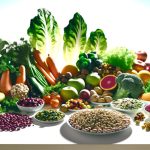Is it possible for vitamins and supplements to assist in maintaining good energy levels along with regular exercise, a balanced diet, low stress levels, and adequate sleep? Let’s try and answer that question. In this article, we examine certain vitamins and supplements that are highly efficient in enhancing one’s energy levels.
There are times when individuals may require additional energy to cope with hectic life situations or during high-intensity workout sessions.
Can Supplements Improve Your Energy?
Vitamin B12
This nutrient is essential for maintaining the health of your blood and nerve cells, as well as for producing genetic material (DNA). However, it is only naturally present in animal-derived foods. Therefore, individuals who follow a vegan or vegetarian diet, are pregnant, suffer from anemia, or experience absorption issues may not be receiving adequate amounts.
Not having enough vitamin B12 can result in fatigue and weakness, but taking supplements may not offer immediate relief. Studies indicate insufficient evidence to support their ability to enhance energy levels.
An adult’s daily requirement of B12 is only 2.4 micrograms (mcg) on average. However, the body has the capacity to store up to 2,000 times more than what is needed daily, which means that it could take several years for deficiency symptoms to occur. A blood test can be conducted by a doctor to confirm whether or not there is a deficiency.
Although supplements can exceed the minimum recommended dosage, they are typically considered safe. However, they should be used cautiously when taken in combination with prescription or non-prescription medications. It is advisable to consult with a medical professional before using any supplements.
Vitamin D
Vitamin D gets its nickname “sunshine vitamin” as it is produced by your skin during exposure to the sun’s UV rays. It is also present in foods such as egg yolks and fatty fish. Inadequate levels of vitamin D can affect bone health, heighten the chances of particular illnesses, and result in muscle pain and weakness.
Insufficient intake of vitamin D often causes muscle fatigue, which is a frequent indication. A deficiency in vitamin D affects over half of the population globally.
Individuals who are more susceptible to being deficient include:
- older adults
- people with darker skin
- people who get less sun exposure, such as those in colder climates
- people with obesity
According to a study conducted in 2013, individuals who showed low levels of vitamin D exhibited enhanced muscle efficiency subsequent to receiving treatment for the deficiency.
Low levels of vitamin D are associated with depression, which often presents with fatigue as a symptom.
A Norwegian study was mentioned in a review where over 400 overweight individuals were given either 20,000 or 40,000 international units of vitamin D every week. The study revealed that after a year, the participants who received the vitamin D showed noticeably decreased symptoms of depression in comparison to those who only took a placebo.
Purium Products that Contain Vitamin D:
Iron
Iron is utilized by your body to produce hemoglobin, a protein found in your blood which transports oxygen to the rest of your body. Low levels of iron can result in feelings of fatigue, exhaustion, and a lack of energy. This condition affects roughly 1 out of 6 seniors as well as about 16% of women experiencing heavy periods. This may also occur in young children. Inadequate levels of iron can cause anemia.
If your hemoglobin levels are low and you feel tired, your doctor may need to give you a blood test to check for iron deficiency. If you are found to be low in iron, you may need to take iron supplements in order to raise your hemoglobin levels and fight off fatigue.
Those who are at a higher risk of iron deficiency are individuals who may experience a shortage of energy and exhaustion due to insufficient iron.
- are menstruating
- are pregnant or breastfeeding
- are vegetarian or vegan
- exercise intensely, especially if female
- donate blood regularly
In a study conducted on menstruating women experiencing unexplained fatigue, those individuals who were administered iron supplements for a period of 12 weeks showed a decrease of 47.7% in fatigue. In comparison, the group given a placebo experienced a decrease of only 28.8%.
It’s important for individuals to consume adequate amounts of fruits and vegetables, particularly citrus fruits and leafy greens, as they contain vitamin C, which can boost absorption when combined with iron-rich foods.
Purium Products that Contain Iron:
Magnesium
Magnesium is required by your body to support nerve and muscle functions as well as energy production. Food sources such as nuts, seeds, whole grains, and dairy are rich in magnesium. The probability of contracting illnesses such as diabetes, high blood pressure, and heart ailments increases when magnesium levels in the body are alarmingly low.
You only require a small amount of magnesium in your daily diet. Incorporating a few servings of magnesium-rich foods into your meals can help you attain your minimum daily requirement. However, consuming high doses of magnesium supplements can lead to adverse effects such as diarrhea and nausea. Consult your physician or pharmacist before taking magnesium supplements.
Purium Products that Contain Magnesium:
Zinc
Your body requires a small quantity of this mineral, which assists in DNA replication, cellular expansion, and upkeep of immune system. It can be found in certain food items such as meat, poultry, and seafood. Men and women should consume a minimum of 11mg and 8mg, respectively, per day.
Supplements in the form of pills or lozenges are available for zinc deficiency, however, excessive intake can lead to stomach discomfort and diarrhea. Furthermore, it can negatively impact the absorption of iron and copper by your body.
Purium Products that Contain Zinc:
Creatine
This category of protein can be found naturally in your muscular system.
Powder or pill supplements are available primarily for athletes and others who engage in intense physical activity. Research indicates that creatine supplements can enhance muscle mass and performance in activities that demand short bursts of power, such as weightlifting and sprints. Nonetheless, there is minimal proof that creatine can combat fatigue or enhance energy levels.
The amino acid called creatine is found predominantly in red meat and seafood, and when taken as a supplement it enhances the amount of creatine in muscles, leading to improved exercise performance.
Creatine was found to be effective in enhancing performance in high intensity exercise according to a review published in the Journal of the International Society of Sports Nutrition, and in addition:
- improving recovery
- helping prevent sports-induced injuries
- reducing the risk of heat-related illness, such as dehydration, when exercising
According to the study authors, people of all ages who are healthy can safely and comfortably use both short-term and long-term supplements.
Coenzyme Q10 (CoQ10)
The body naturally contains Coenzyme Q10 (CoQ10), an enzyme most abundantly found in the heart, liver, pancreas, and kidneys. It enhances energy levels, serves as an antioxidative agent, and fortifies the immune system.
A well-rounded diet that contains certain foods can provide individuals with sufficient amounts of CoQ10.
- oily fish
- liver or other organ meats
- whole grains
Individuals who have specific medical conditions or are deficient in CoQ10 from their diet should consult with their physician regarding the possibility of taking supplements containing CoQ10.
Before taking CoQ10, individuals who are on blood thinners, insulin, or undergoing cancer treatment should consult with a medical professional.
Possible mild effects of CoQ10 may involve:
- diarrhea
- rash
- insomnia
The prescribed amount ranges from 30mg to 90mg per day, with an upper limit of 200mg per day.
Ashwagandha
Feelings of fatigue and low energy can be caused by stress and anxiety. Additionally, individuals may feel less equipped to handle daily responsibilities.
Ashwagandha, an adaptogen, has the potential to enhance energy levels by assisting the body in coping with stress. Adaptogens are natural substances derived from plants that assist in managing stress.
In 2012, a study was conducted by researchers who discovered that ashwagandha root extract was beneficial in mitigating stress and anxiety. The group of individuals who ingested ashwagandha experienced decreased cortisol levels and lower stress levels after 60 days, in comparison to the placebo group.
The researchers also observed that ashwagandha was safe and well-tolerated.
Another study has indicated that ashwagandha could potentially enhance exercise endurance. Elite cyclists who consumed 500 mg capsules of ashwagandha twice a day displayed improved endurance rates, according to the findings of the researchers.
L-theanine
When L-theanine is partnered with caffeine, it has the potential to augment cognitive functioning and energy levels. L-theanine occurs naturally in tea.
In a study conducted in 2017, 20 healthy males were examined to determine the impact of L-theanine and L-theanine combined with caffeine on their attention levels. The study revealed that the highest performance in attention levels was observed when higher doses of L-theanine were combined with caffeine.
In 2010, another research discovered that young adults experienced enhanced cognitive performance, with decreased fatigue and increased alertness, after consuming a blend of 97 mg L-theanine and 40 mg caffeine.
Side Effects and Risks
There are minor side effects that some individuals may experience from taking vitamins and supplements. However, if there are any significant side effects, the person should discontinue usage immediately and consult with a medical professional.
Potential dangers associated with the consumption of supplements and vitamins include:
- Ashwagandha: This herb is generally safe, but it has links to liver damage in rare cases.
- CoQ10: This supplement may interact with blood thinners and insulin medications.
- Vitamin D: It is impossible for a person to get too much vitamin D from the sun, but taking too many vitamin D supplements can cause adverse symptoms and dangerously raise blood levels of calcium.
- Vitamin B: There are no adverse effects associated with taking vitamin B.
- Creatine: This supplement may cause weight gain, as it draws water from the body toward the muscles. People should be sure to drink extra fluids to stay hydrated.
- Iron: Although iron poisoning is rare, taking too much iron can cause an upset stomach, nausea, abdominal pain, and vomiting.
- L-theanine: This supplement contains caffeine and may cause sleep problems and other unwanted effects in some people.
Before taking any supplement, it’s important for individuals who are already on medication for a particular health issue to consult with a doctor or pharmacist regarding the possibility of any interactions. This is because some supplements may affect how certain medications work.
Before consuming any new supplements, pregnant or breastfeeding women must consult with a physician.









